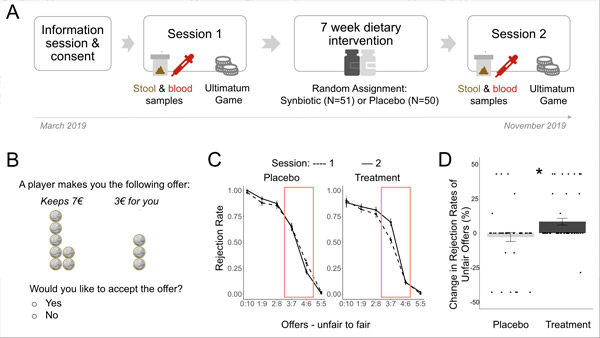
All iLive content is medically reviewed or fact checked to ensure as much factual accuracy as possible.
We have strict sourcing guidelines and only link to reputable media sites, academic research institutions and, whenever possible, medically peer reviewed studies. Note that the numbers in parentheses ([1], [2], etc.) are clickable links to these studies.
If you feel that any of our content is inaccurate, out-of-date, or otherwise questionable, please select it and press Ctrl + Enter.
Understanding the role of interactions between the gut microbiome and the brain in social decision making
Last reviewed: 02.07.2025
 ">
">Taking pro- and prebiotics may make people more sensitive to fairness, even at the cost of losing money, according to a study published in the journal PNAS Nexus.
The role of the human gut microbiome in shaping behavior is only beginning to be explored. Hilke Plassmann and colleagues tested whether taking pro- and prebiotics could influence the level of altruistic punishment.
Fifty-one participants took a supplement containing Lactobacillus and Bifidobacterium for seven weeks. Another fifty participants served as a control group and took a placebo.
Before and after seven weeks of supplementation, participants were asked to play an "ultimatum game" in which one player controls a sum of money and can offer a share or "split" it with a second player. The second player can accept the offer and take the money, or reject it, in which case neither player gets any money. Rejecting an unfair offer is interpreted as "altruistic punishment" because the rejector sacrifices any small share offered to punish the first player for not being generous enough.
Players who took the supplements were more likely to reject offers. In particular, they were more likely to reject offers with a 30%–40% split. (All players tended to reject extremely unequal splits.)

(A) Study flow and randomization. (B) Example of an unfair offer in the ultimatum game. (C) Distribution of rates of refusal of all offers for each group and each session. (D) Change in rates of refusal of unfair offers across sessions for each group (dots are slightly shifted for visibility). Source: Plassmann et al.
Players who had a high Firmicutes to Bacteroidetes ratio at the start of the study showed the greatest changes in both their gut microbiome composition and their levels of altruistic punishment. In some participants, the supplements reduced plasma levels of the dopamine precursor tyrosine, and it was these players who showed the largest increases in altruistic punishment.
According to the authors, people who altered their gut microbiome to a state considered healthier became less rational and more sensitive to social aspects.
